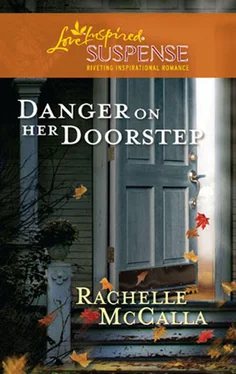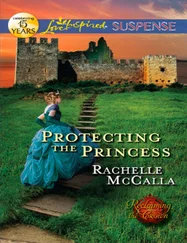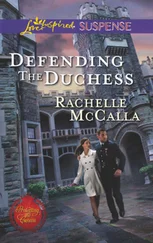Reluctantly, Maggie shook his hand, once again surprised by the warmth she felt at that simple contact, and by the glittering blackness of his eyes in the dusky room. “I appreciate your willingness to take on the job, in spite of its complexity.” She fumbled over her words as she looked up at him, feeling an odd connection with the man who knew her father so well. With the man who’d found her father’s dead body.
Gideon arrived at the house on Shady Oak Lane ten minutes early and settled his tool belt around his hips where his gun belt used to sit. The weight of the hammer and measuring tape weren’t equal to that of his gun and billy club, but it nonetheless felt good to wear the tools of a trade again, even if it wasn’t his chosen trade.
He grabbed his clipboard and circled the property, watchful for any signs of disturbance or clues that may have been missed before. It bothered him that Glen Arnold’s murderer was still at large, without even so much as an investigation under way to catch him. If Gideon had anything to say about it, the murderer would be caught. He might not be sheriff any longer, but he’d ensure the future safety of Glen Arnold’s daughter. He owed the man that much.
As he came around to the front side of the house, he saw Maggie drive up in her father’s truck, looking even smaller than usual behind the wheel of the full-size pickup. Poor girl. She looked skittish as she hopped out of the front seat, glancing around nervously as though her father’s murderer might leap out of the bushes at any moment. Even from across the yard, he could see the fear on her face, the same vulnerability that had crossed her expression so many times when they’d spoken the day before.
His jaw tightened along with his resolve. He would keep this woman safe. He’d failed her father. He’d failed all of Holyoake County by missing the clues to his brother’s drug-making activities for so long. He wouldn’t be able to live with himself if he failed Maggie Arnold, too.
“Good morning,” he called out so she wouldn’t be startled by his approach. “Just thought I’d secure the perimeter before we start.”
Her tense expression relaxed slightly. “I appreciate that. You wouldn’t think less of me if I told you this place gives me the creeps?” She fell into step beside him as they made their way up the overgrown front path to the porch steps.
Gideon held the screen door open for her as she worked her key in the front-door lock. “Don’t ever be ashamed of being afraid. Sometimes fear is what keeps us alive.”
Maggie froze and looked up at him. “My father used to say that.”
“I know. He’s the one who taught it to me.” Gideon reached past Maggie, and since she had the door unlocked but couldn’t seem to get it pushed open, he placed one hand gently over hers on the knob, slammed his other open hand against the wedged wood, and the door fell back with a shudder. “I should do something about that door,” he offered.
But Maggie had stepped inside and was already looking around the great foyer that opened upward to the stud-walled second floor. “I think we’ve got plenty of other projects that are more pressing.”
“Where do you want to start?” Gideon asked.
With a long sigh, Maggie shook her head. She clearly felt overwhelmed by the immensity of the project and all that needed to be done. Not that he could blame her. He’d lain awake the night before, trying to break down the renovation process into manageable steps until he’d lost track of where he’d started. It was such a large house and needed so much work.
“This place will be spectacular once it’s finished,” he said in hopes of encouraging her.
She didn’t look encouraged. Instead, she looked as though the responsibility of transforming the house into something spectacular weighed on her even more heavily than simply making it habitable. Gideon was reminded that he didn’t know exactly what her plans were. She’d told him a few things, and he’d inferred the rest based on what he’d have done if the place were his. Those two were likely very different things.
“What are your plans for the house?”
Maggie took a gulp of air. “I want to be able to sell it. My father bought it as a foreclosure after Lorna Creel fell behind on her mortgage payments. From what I can tell, Dad’s plans were to convert it back into apartments.”
“I didn’t realize this place had ever been apartments.”
“That was before either of us was born,” Maggie explained. “I found some of the history my father had collected about the house, and Susan Isakson, the Realtor who’s representing my dad’s other properties, let me in on what she knew. This house was built in 1912 as a single-family home, but it was converted into apartments during the Depression. Then in the 1950s Len Turner bought it and turned it into a funeral home.”
“That’s how I always remembered it.” Gideon stepped into the front parlor, arguably the nicest room in the house, though the elaborate wallpaper had to have been several decades old and the wood-inlaid parlor set was worn and rickety.
“He spent his whole career here,” Maggie continued. “Somewhere along the line, he hired Lorna Creel as an assistant. She helped with the funerals and took care of the cleaning and upkeep, as well as living upstairs. When Len retired he sold the house to Lorna, who wanted to continue living here.”
“But she fell behind on her mortgage payments.” Gideon patched the story together.
“Yes. The First Bank of Holyoake held the mortgage, and from what I understand they didn’t want to foreclose on her. They gave her plenty of chances, but she refused to talk with them or refinance, so ultimately, they did what they had to do.”
“And they sold the house to your father?”
“Yes. He gutted the second floor. I found several of his drawings showing how he intended to convert the house back into apartments.”
Gideon recalled from his years working with Glen Arnold when he was younger that the man had a knack for buying up older, unwanted properties and updating them, eventually renovating them into more practical living spaces. Gideon had long been impressed with the man’s ingenuity. “And you’re planning to move forward with your father’s plans?”
Maggie looked stricken. “No.” She shook her head firmly. “It always bothered me the way he took lovely older homes and carved them up into cramped apartments. I thought we could just put it back the way it was—a gracious, single-family home.”
Gideon nodded and suppressed his smile. Something had lit up behind Maggie’s eyes as she stated her plans. Perhaps she wasn’t as afraid of the old house as he’d thought.
“And then you’re planning to sell it?”
“Yes.” Her eyes bent up at the corners. “I’m selling all my father’s properties. The hospital where I work in Kansas City is building a new addition, including an expanded pediatric unit. If I can get fair market value out of what my father left me, I can have one of the rooms of the unit named in his honor. It’s been the one thing that’s kept me going since his death.”
Gideon turned and looked at the room behind him so Maggie wouldn’t see his smile. The shy girl he’d gone to school with had grown up into a private woman, but whether she realized it or not, she’d given him a glimpse of what made her tick. Much as he appreciated Glen Arnold’s skill in converting old houses into apartments, his daughter’s approach more closely paralleled his own preferences. He’d love to see the old house as it was meant to be again.
Maggie’s voice echoed behind him. “I know it’s going to take a lot of work to bring this place up to code, but as Susan explained it, that’s the only way we’re going to see any profit.”
Читать дальше












